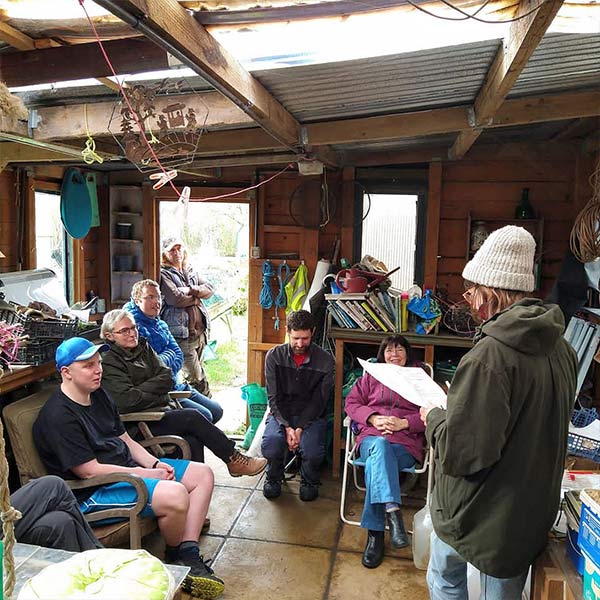The new book Following the Call: Living the Sermon on the Mount Together, edited by Charles E. Moore, is a Plough anthology of weekly readings, bringing together insights on the Sermon on the Mount from a wealth of traditions.
E. Stanley Jones
Beyond Duty
There is a “beyondness” in the Sermon on the Mount that startles and appalls the legalistic mind. It sees no limit to duty – the first mile does not suffice, he will go two; the coat is not enough, he will give the cloak also; to love friends is not enough, he will love enemies as well. Come to that with the legalistic mind and it is impossible and absurd; come to it with the mind of the lover and nothing else is possible. The lover’s attitude is not one of duty, but one of privilege. Here is the key to the Sermon on the Mount. We mistake it entirely if we look on it as the chart of the Christian’s duty; rather, it is the charter of the Christian’s liberty – his liberty to go beyond, to do the thing that love impels and not merely the thing that duty compels.
Barbara Brown Taylor
Exceeding Righteousness
I am so sorry to tell you this, but Jesus was just not a very good Protestant. He was a Jew, for whom good works were not optional. He was the loving son of the Light-Giver who gave the law, and he expected those who followed him to follow it too, right down to the last jot and tittle. Later Paul would mount some good arguments about how the law was God’s grace for Jews, while God had something different in mind for Gentiles. But however our view of the law has changed through the years, our spiritual ancestors had the good sense to preserve this core teaching of Jesus in the Sermon on the Mount: God expects us to step up. Righteousness is a good thing. Exceeding righteousness is even better. Knowing God’s word is no substitute for doing it.

Quino AL
Teresa of Ávila
The Meek
Who can say that he possesses any virtue, or that he is rich, if at the time when he most needs this virtue he finds himself devoid of it? No, let us rather think of ourselves as lacking it and not run into debt without having the means of repayment. Our treasure must come from elsewhere and we never know when God will leave us in this prison of our misery without giving us any. If others, thinking we are good, bestow favors and honors upon us, both they and we shall look foolish when, as I say, it becomes clear that our virtues are only lent us. The truth is that, if we serve the Lord with humility, he will sooner or later succor us in our needs. But, if we are not strong in this virtue, the Lord will leave us to ourselves, as they say, at every step. This is a great favor on his part, for it helps us to realize fully that we have nothing which has not been given us.
Oscar Romero
Persecuted Because of Righteousness
This is the mission entrusted to the church, a difficult mission: to uproot sins from history, to uproot sins from politics, to uproot sins from the economy, to uproot sins from wherever they are. What a difficult task! The church has to confront conflicts caused by great selfishness, great pride, and great vanity because so many people have enthroned the kingdom of sin among us. The church must suffer for speaking the truth, for denouncing sin, and for uprooting sin. No one wants to have a sore spot touched, and therefore a society with so many sores reacts strongly when someone has the courage to touch the sore and say: “You have to treat that. You have to eliminate that. Believe in Christ and be converted.”
Bakr Magrabi
Martin Luther King Jr.
Turn the Other Cheek
Through violence you may murder the liar, but you cannot murder the lie, nor establish the truth. Through violence you may murder the hater, but you do not murder hate. In fact, violence merely increases hate. So it goes. Returning violence for violence multiplies violence, adding deeper darkness to a night already devoid of stars. Darkness cannot drive out darkness; only light can do that. Hate cannot drive out hate; only love can do that.
Eberhard Arnold
Thy Kingdom Come
Prayer must never supplant work. If we sincerely ask God for his will to be done, for his nature to be revealed in our work, for his rule to bring humankind to unity, justice, and love, then our life will be one of work. Faith without works is dead. Prayer without work is hypocrisy. Unless we actively work to build for God’s kingdom, the Lord’s Prayer – “Your kingdom come” – is a lie on our lips. The purpose of Jesus’ prayer is to bring us to the point where its meaning is lived out, where it actually happens and becomes part of history. Each of us needs to find a way to devote our whole working strength so that God is honored, his will is done, and his kingdom comes.
Meister Eckhart
Thy Will Be Done
We deafen God day and night with our words, “Lord, thy will be done.” But then when God’s will does happen, we are furious and don’t like it a bit. When our will becomes God’s will, that is certainly good; but how much better it would be if God’s will were to become our will. But as it is now, when you are sick, of course you don’t want to be well against God’s will, but you wish that it were God’s will for you to get well. … Anyone who by God’s grace unites his will purely and completely with God’s will has no need other than to say in his ardent longing: “Lord, show me what is thy dearest will and give me strength to do it!” And God will do this, as truly as he lives, and to such a one he will give in great abundance and all perfection.
Leonardo Boff
Our Daily Bread
The need for bread is an individual matter, but the satisfaction of that need cannot be an individual effort; it must be that of a community. Thus we do not pray “my Father,” but “our Father.” … This bread that is jointly produced must be distributed and consumed in concert with others. Only then can we truthfully ask for our daily bread. God does not hear the prayer that asks only for my bread. A genuine relationship with God calls for maintaining a relationship with others. When we present God with our own needs, he wants us to include those of our brothers and sisters. Otherwise the bonds of fellowship are severed and we live only for ourselves. We all share the same basic necessity; collective satisfaction of that need makes us brothers and sisters.
Africa Studio / Shutterstock
C. S. Lewis
Two Ways
The more you obey your conscience, the more your conscience will demand of you. And your natural self, which is thus being starved and hampered and worried at every turn, will get angrier and angrier. In the end, you will either give up trying to be good, or else become one of those people who, as they say, “live for others” but always in a discontented, grumbling way – always wondering why the others do not notice it more and always making a martyr of yourself. And once you become that you will be a far greater pest to anyone who has to live with you than you would have been if you had remained frankly selfish.
The Christian way is different: harder, and easier. Christ says, “Give me All. I don’t want so much of your time and so much of your money and so much of your work: I want You. I have not come to torment your natural self, but to kill it. No half-measures are any good. I don’t want to cut off a branch here and a branch there, I want to have the whole tree down. I don’t want to drill the tooth, or crown it, or stop it, but to have it out. Hand over the whole natural self, all the desires which you think innocent as well as the ones you think wicked – the whole outfit. I will give you a new self instead. In fact, I will give you myself: my own will shall become yours.”
Hermas
Put the Lord in Your Heart
“Sir, these commandments are great and good and glorious, and are able to gladden the heart of the one who is able to keep them. But I do not know if these commandments can be kept by a human, for they are very hard.” … “Those who have the Lord in their heart,” he said, “can master everything, including all these commandments. But to those who have the Lord on their lips but whose heart is hardened and who are far from the Lord, these commandments are hard and difficult. You, therefore, who are empty and fickle in the faith, put the Lord in your heart and you will realize that nothing is easier or sweeter or more gentle than these commandments.”
Ono Kosuki
Dietrich Bonhoeffer
Whoever Hears These Words
Humanly speaking, we could understand and interpret the Sermon on the Mount in a thousand different ways. Jesus knows only one possibility: simple surrender and obedience, not interpreting it or applying it, but doing and obeying it. … He does not mean that it is to be discussed as an ideal, he really means us to get on with it.
E. Stanley Jones, A Working Philosophy of Life (Potomac, MD: E. Stanley Jones Foundation, 2017), 36–37. Barbara Brown Taylor, “The Grace of Good Works,” sermon preached in Duke University Chapel, February 9, 2014. Saint Teresa of Ávila, The Way of Perfection, translated by E. Allison Peers (New York: Image Books, 1964), 148–149. Oscar Romero, A Prophetic Bishop Speaks to His People: The Complete Homilies of Archbishop Oscar Arnulfo Romero, vol. 2, trans. Joseph Owens, SJ (Miami: Convivium Press, 2015), 203. Martin Luther King Jr., “Where Do We Go from Here?” speech, Eleventh Annual SCLC Convention, Atlanta, Georgia, August 16, 1967. Eberhard Arnold, The Prayer God Answers (Walden, NY: Plough Publishing House, 2016), 37. Meister Eckhart, Meister Eckhart spricht (Munich: Verlag Ars Sacra/Josef Müller Verlag, 1925), selections translated by Plough editors. Leonardo Boff, Praying with Jesus and Mary (Maryknoll, NY: Orbis Books, 2005), 78–79. The Shepherd of Hermas, The Apostolic Fathers, third edition, ed. and trans. Michael W. Holmes (Grand Rapids, MI: Baker Academic, 2007), 549–551. C. S. Lewis, Mere Christianity (New York: HarperOne: 2001), 196–197. Dietrich Bonhoeffer, The Cost of Discipleship, trans. Reginald H. Fuller (London: SCM Press, 1959), 175.











